The evolution of skateboarding and why Pushing Boarders is a sign of the times
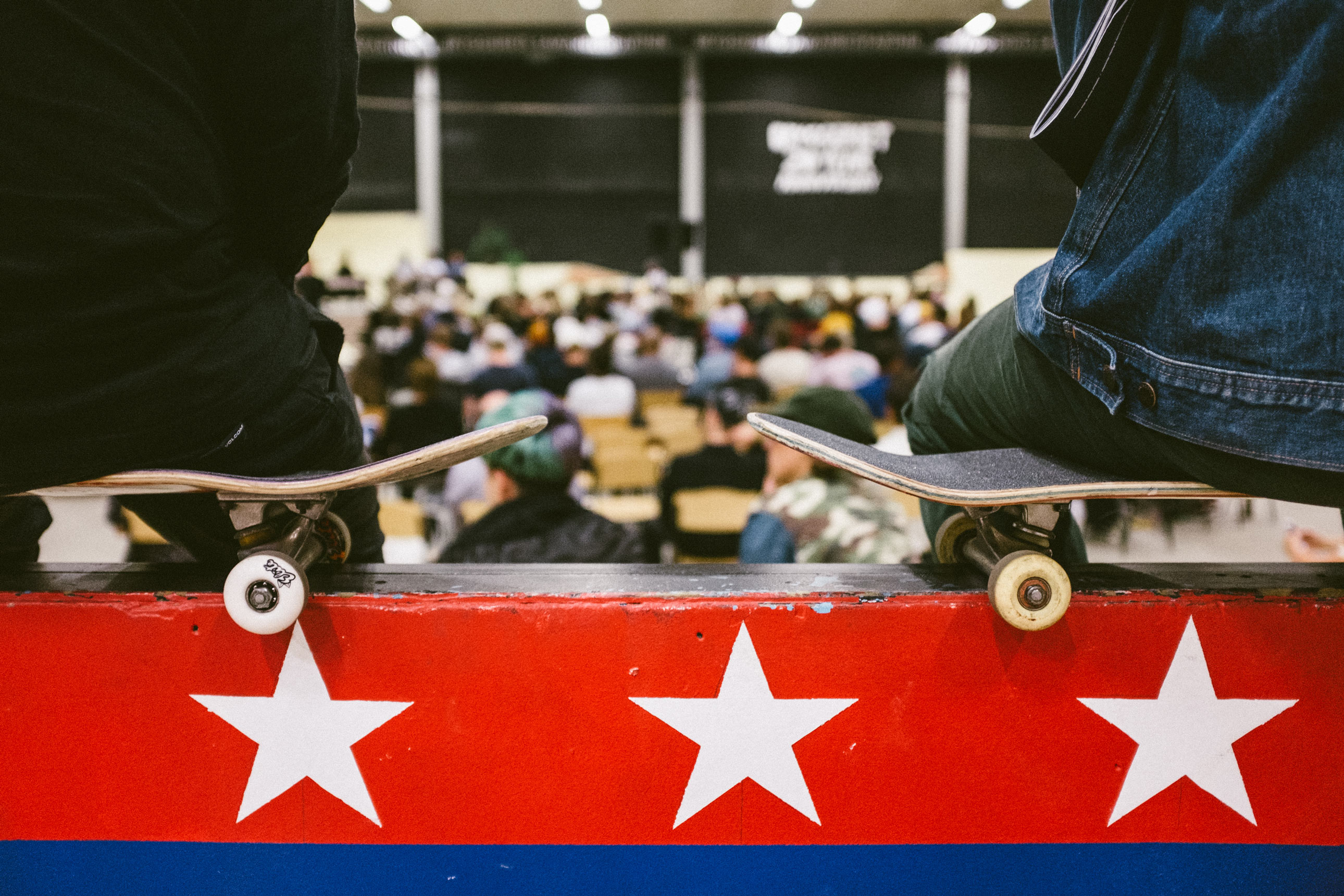

Pushing Boarders is the world’s only skateboarding conference, connecting a wide range of socially progressive groups and individuals, from emerging researchers to top professional skaters. This is the first of a three part article series featuring interviews with the womxn and non-binary skaters who attended.
The opening day venue was deeply reflective of the culture of skateboarding. At Bryggeriet High School, the main way down was by a narrow spiral staircase at the side of a vert ramp which lead to the indoor skatepark. There attendees instantly viewed a unique stage set-up of ‘talk show’ type loungers and microphones on top of a platform which would usually be a smooth run up to a sweet looking stair set and rail. The airport hanger sized flat ground area below had more rails, a street style curb, a rabbit warren of bowls, ledges and banks, all turned temporarily into a home for a sea of chairs, cables, boards, bags and people dressed in the most interestingly varied outfits probably ever seen in the history of academic conferences. Some wore gear coded with ‘core skater’ attributes and street cred, others were all ‘bowl is how I roll’ knee-high socks and hesh attire. There were faces with eye shadow and lipstick, legs with eco-non-sweat shop made pants and proudly worn T-shirts with rainbow designs or images of Queer icons. And there was also a scattering of attendees in professorial jackets and business outfits, surprisingly coupled with hole-ridden and weathered shoes giving away tell tale signs they were skateboarders too. Welcome to the world of Pushing Boarders.
This was a conference with some of the world’s most established and also freshly emerging skate academics, yet also part dream skate trip, with demos, street comps and spot tours; and part festival, with films, readings, photo exhibits, beers, shared meals and karaoke for anyone keen. The event was held in August 2019 in the Swedish skate paradise that is Malmö, and running for its second year (the first in London 2018). Created with the aim of bringing together some of the most well-known skaters as well as those rarely heard, the event’s main commitment is to ‘real talk’, addressing social issues and steps to social inclusion. Unlike most mainstream representations of skateboarding that can lack diversity in terms of say, gender and sexuality, last year’s program aimed at breaking the ‘grip and maplewood’ ceiling. Speakers included legends such as Elissa Steamer, Jilleen Liao from Heavy Discussions, M Dabdadie from Xem Magazine, Becky Beal, an American based skate academic and Tara Jepsen from Pave the Way. This year’s line-up continued to make an effort to balance the ‘bro ratio’ and with an even wider global emphasis, with invited guests such as Candy Jacobs from the Netherlands, Lucy Adams from the UK, American Leo* Baker plus Mimi Knoop from Women’s Skate Alliance, Kristin Ebeling from Vent City, Skate Like a Girl and The Skate Witches and Briana King from Display Only also from the USA, Atita Verghese from Girls Skate India, Leyla Garboza from Peru’s Concrete Jungle Foundation, Dr Dani Abulhawa a British-Palestinian Skate Pal Ambassador, and many more.
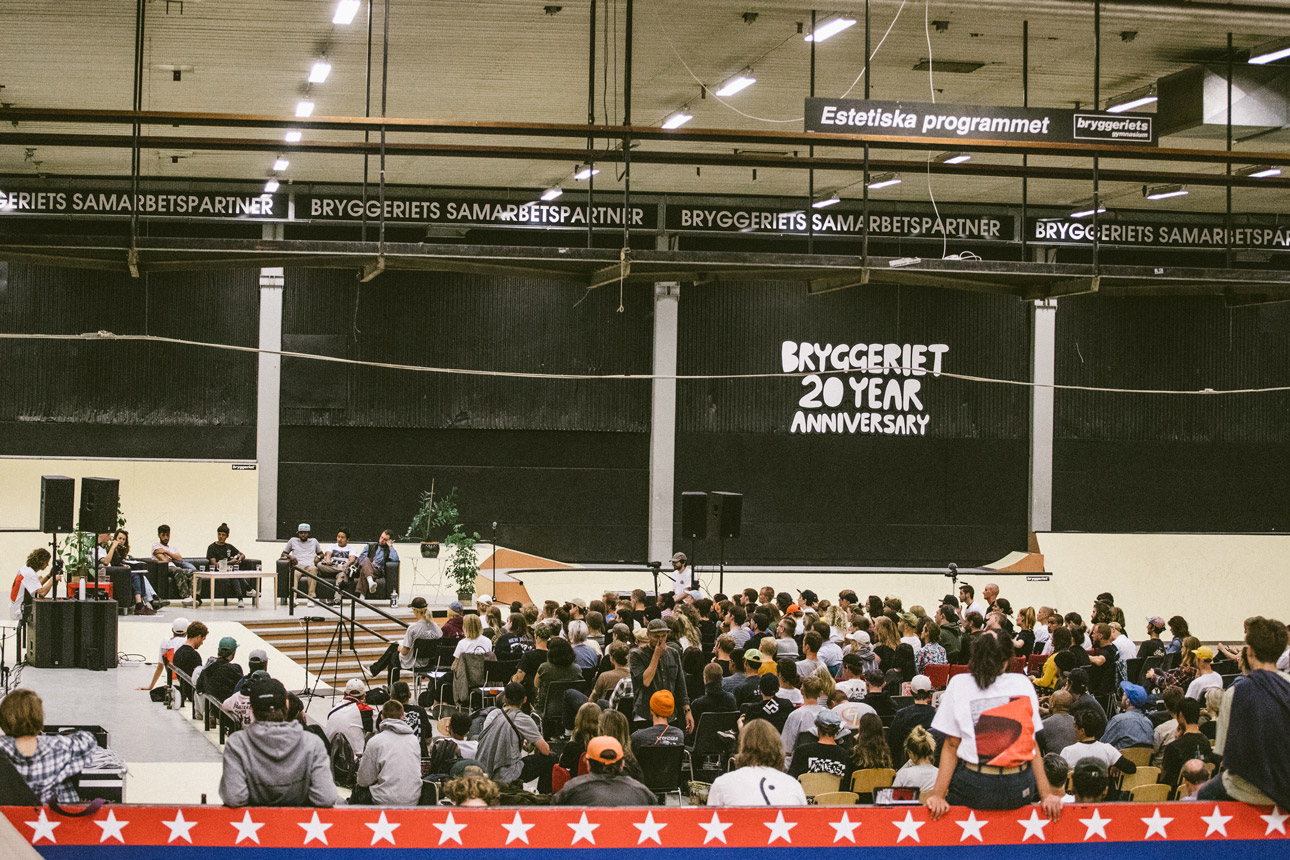
Committed to creating egalitarian and ethical conduct, the organizers made an effort to tame down fame hierarchies so that everyone felt it was possible to talk and listen to each other freely. No VIP tents or roped off areas, on any given day skaters of all backgrounds could be in a line-up for a skate run, panel spot, karaoke song, cold beer or even breakfast cereals at the conference hotel. Most speakers shared a room with one other, with organizers allocating some of the world’s top ranking and globally influential skaters with everyone else giving a talk. And, at the entirely free and open to the public talks you’d often be sitting beside not just a pro-skater, but maybe an architect, skate company owner, artist, concreter, zine maker, university professor, activist, social media content creator, a poet, journalist, social worker, an environmentalist, filmmaker, a teenage die hard skate rat and even their school principal.
Most attendees were lifelong skateboarders, but some did not pick up a board until their late 20s and even 40s, including mums who have become die-hard skaters since. There were also individuals who are not skaters yet bring different and valuable fresh eyes from outside the scene. And a typical day would begin with the energetic hum, rhythm and flow of people of various genders, sexualities, ages and backgrounds moving around together as fellow audience members, skaters and when socialising afterwards. Listening to animated conversations all around, you could also hear a rich international mix of Peruvian, Swedish, Spanish, Australian, Finnish, Singaporean, Palestinian and other accents, generously peppered with the universal language of skateboarding. No event will cover every demographic, with some attendees urging for more First Nations skaters, People of Colour, Non-Binary and Gender Queer skaters and People with Disabilities to be present in following years for instance. But the wide variety of topics that were covered each day, in the panel talks and elsewhere during the conference, was remarkable given a handful of men had voluntarily organized it (who were mostly heterosexual, white and cis, meaning gender assigned at birth). The list of speakers and talk themes are on the Pushing Boarders website which will also feature video recordings of all this year’s talks soon.
In this three-part article series by Dr Indigo Willing, who was a speaker on ‘The University of Skate: Support Your Local Academic’ Panel, Yeah Girl explores the perspectives, hopes and advice of girls, women, womxn* and non-binary skaters who attended (panellists, event volunteers and audience members). Indigo was there as a researcher, co-founder of Girls Skate Brisbane and to facilitate the launch of Consent is Rad. Part 1 explores how the Pushing Boarders ‘2019 alumni’ feels skateboarding has changed from the past and why such a conference matters to skateboarding at this very moment.
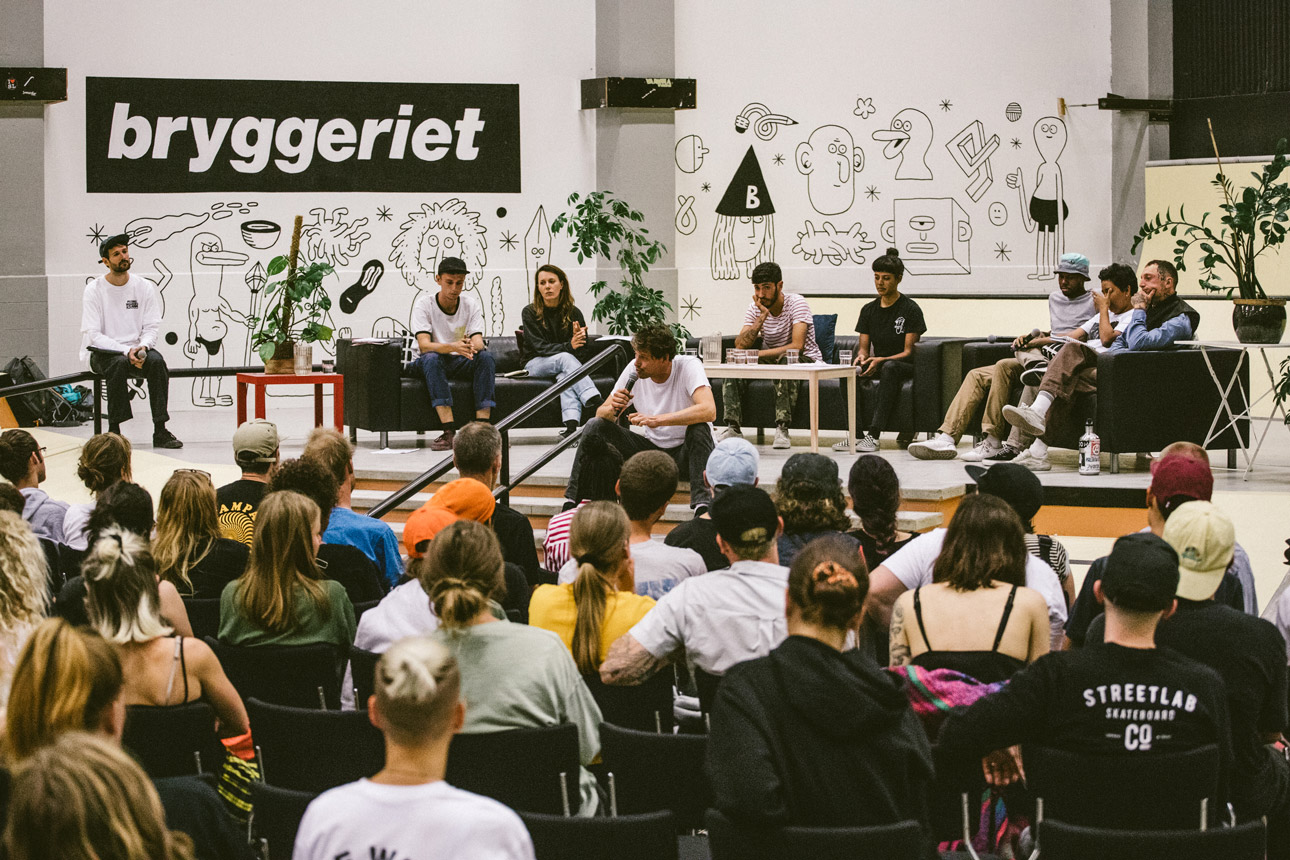
In the mid-90s researchers such as Becky Beal argued that while boys and men were clearly the most dominant population in skateboarding, the ‘core’ culture often positioned others as inferior rather than just being a different but equally valued part of the scene. At the start of the new millennium, researchers such as Lia Karsten and Eva Pel observed that while street skating was becoming increasingly progressive, it still had a long way to go in terms of issues of inclusion. Writer Tara Jepsen has raised similar points about aspects in the pool skating culture and Mimi Knoop, former pro-skater and Women’s Skateboarding Alliance founder, has recently talked to Ryan Lay on Vent City about numerous hurdles that made it difficult for girls and women to even have a spot in the big competitions. Given the wealth of skating experience and brains trust at Pushing Boarders, I was keen to find out how attendees felt skateboarding has changed.
What better place to start than with Betsy Gordon, a panellist who has worked in museums for over 35 years, including at the Smithsonian Museum in the USA and being a curator of skateboarding exhibitions. She states, “What has changed in skateboard culture from its beginnings in the 1960s is everything! Skateboarding has become global, has morphed from a homemade child’s toy to a multi-billion dollar manufacturing industry, has established distinct categories of athletic performance and competition, has become a tool for social justice and trauma intervention, has embraced and given voice to marginalized, underrepresented cultures, has spawned distinct practices of design, filmmaking, photography, content distribution, education, and academic research, and so on and so forth. The list is ever expanding”. Yet despite these evolutions, it has not all been positive. Betsy continues, “Everything has changed, yet not every change has resulted in the betterment of our global community… Skateboarding is not perfect. Skateboarders are not perfect. The world is deeply and cruelly flawed. “Better” is a hard term to define, even harder to enable and enforce”.
Sheareen Redlener’s current work involves reducing incarceration and recidivism rates in the U.S., through therapeutic skateboarding programs and she attended to listen to the talks. But going further back, she worked with skate and streetwear brands. Giving some insight from the industry side, she explains “20 years ago, I tried to get the skate company I worked for to understand that there was an incredible myriad of skaters, I was told “women want to look like porn stars”…I’m glad Instagram came along; it changed the face of womxns skateboarding exponentially, the last 5 years alone, it’s been insane!” At the conference she showed me an old picture on her phone of a campaign a skate company had wanted that showed a woman wearing very little in a ‘sexy’ pose. She then showed me an image she finally got the company to accept, which was a photo of a woman dressed in typical skater clothes who looked confident and empowered.
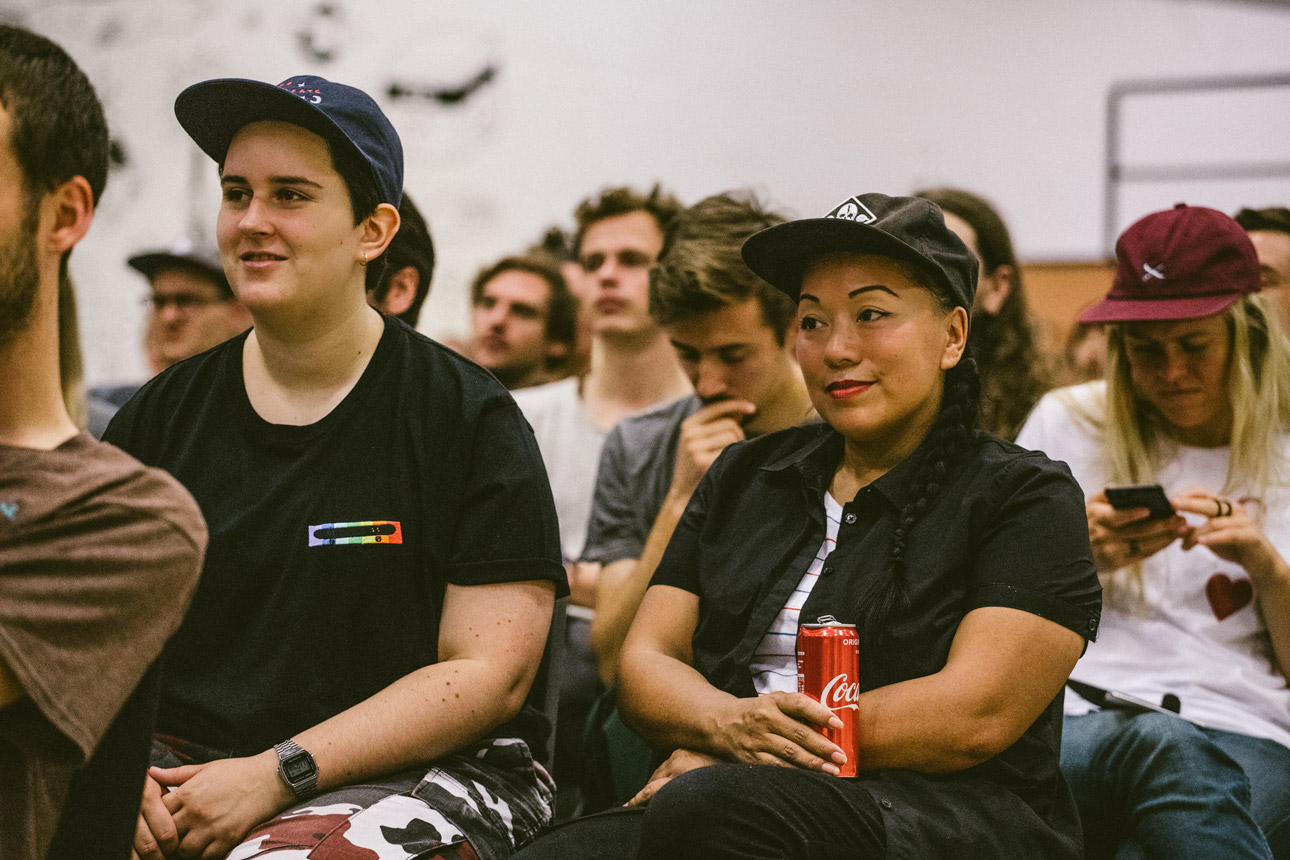
American powerhouse Kim Woozy, panellist, and founder of Slmbr Party, Mahfia TV and also working for Skate Like A Girl San Francisco Bay, highlights how it has been women who have steered changes both in the industry and more widely, commenting “… in my experience women were rarely invited to be in a conversation. Women in the industry & community were having plenty of discussions about what we were seeing and experiencing and what actions we saw to take but we were doing it on our own — rarely in the spotlight/on a public platform or with men and people in positions of power listening. We created our own power by creating our own platforms, companies, events, etc. Eventually everyone else started listening”.
Researcher Beatrice Hallman, a PhD candidate in Sweden who was also a presenter in the Academic Forum points to how visibility and recognition by the mainstream can still be an issue. She states, “there are numerous brilliant skateboarding women taking photos, making films, organizing camps and networking for women skateboarding… most of them don’t get the ‘airtime’ they deserve. Some of them are creating platforms for themselves to act in, because parts of the skateboard community are not aware yet of these genius woman skateboarders”.
Atita Verghese, founder of Girls Skate India and panellist, nods to some of those pioneers in women’s skating who made a difference, “When I started Girls Skate India two years after I started skateboarding, my main source was the Girls Skate Network and the videos from Lisa Whitaker” [also founder of Meow Skateboards]. She notes today that, “There are so many girls and women that are skateboarding now in the world that it’s hard to keep up with it. I wish that this would be the case in my own country as well”.
Dr Dani Abulhawa, a senior lecturer from Sheffield Hallam University, Pushing Boarders Academic Forum co-organiser and panellist, and an ambassador for SkatePal of Palestinian and British heritage also observed changes in skate forums and skate media. She states, “So much has changed for the better… in the general attitudes of skateboarders at skateparks and spots. People are more open to criticism and being critical of skateboarding as a culture. I can remember growing up that any kind of critique about skateboarding, or about unequal pay, was just not tolerated. I would regularly go on the Sidewalk Magazine online forum and bemoan these things and rarely ever got any support. As the years have gone on, people are more supportive and likely to back me up”.
Despite this, those on the frontline of social media platforms like Instagram still see resistance. Imke Leerink, founder of Girls Shred and a panellist from the Netherlands, states, “Definitely a lot has changed for women’s skateboarding. Looking at all the communities and groups plus media outlets that pop up is amazing to see. Yet there is still a long way to go… With social media it also can be a bigger struggle for women out there because nowadays it’s so easy to say whatever you want safely from behind your phone or tablet”.
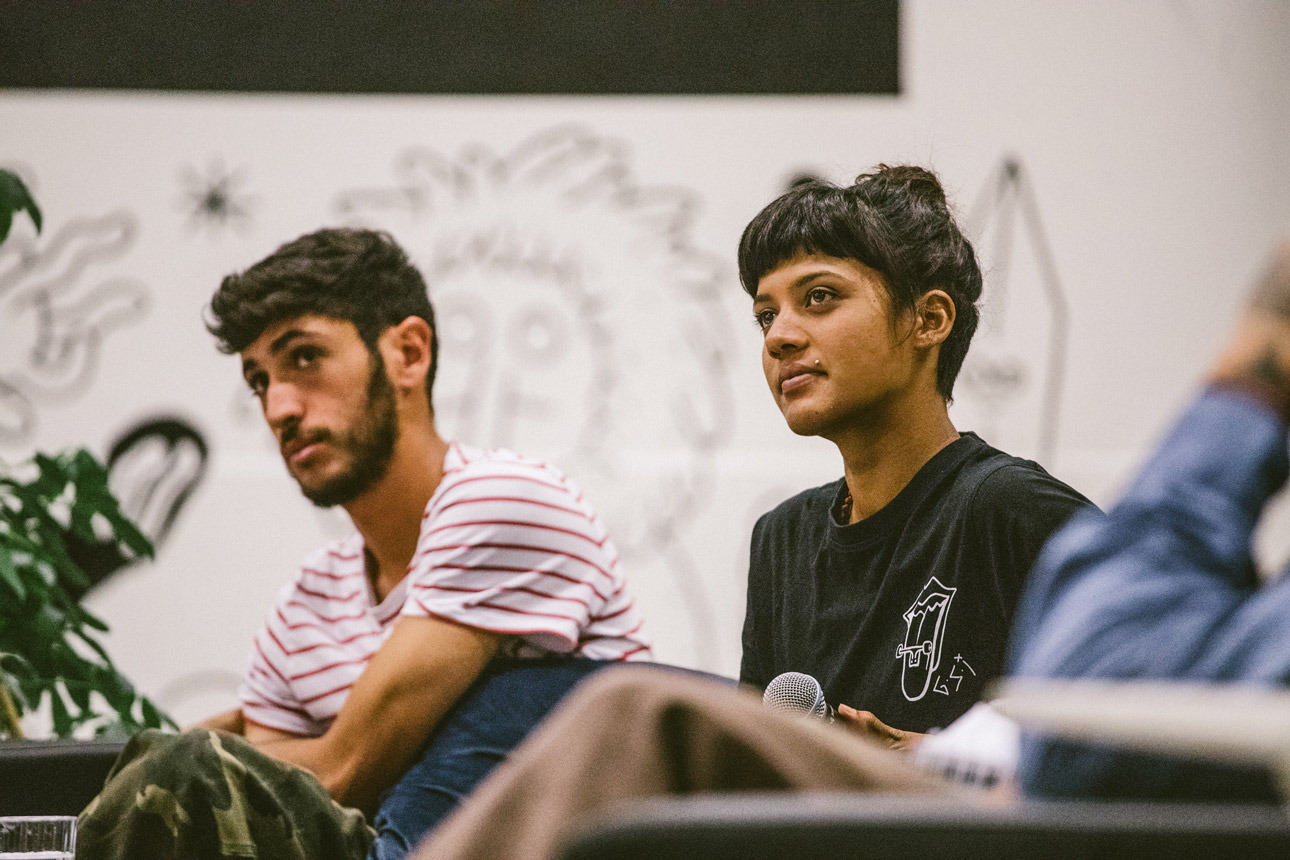
Another theme when attendees were asked to reflect on changes was that of intersectionality and diversity in skating. From a researcher’s perspective, Dr Pollyanna Ruiz, a panellist from The University of Sussex in the UK observes, “I think I most noticed the move from thinking about inclusivity in the abstract to making changes that are inclusive in practice… The notion of inclusivity is constantly being opened up to accommodate an ever-wider range of differences. When I first got involved in researching this area the talk was about women. Now there is also an emphasis on race, sexuality, trans rights, disability, and so on”.
Pro-skater and panellist Candy Jacobs from the Netherlands agrees, “When I started skating professionally I think half of the topics we talked about at Pushing Boarders were never even addressed — diversity, prejudice and the responsibility you have being in the skateboard scene. I have seen the skate scene, the skateparks I go to have a more diverse public, it is more open and there is a bigger market”.
Lucy Adams from the UK, also a panellist and pro-skater, has also seen many positive changes. She states, “In 1997 I literally was the only woman skater in my area… in 2019 we can see a massive rise in participation in skateboarding for women and girls. I think PB showed me that there is much more awareness in skateboarding about the things that aren’t right or ok, but that have been swept under the rug or not mentioned since the beginning. Skaters now seem more open to learning about how we can all try to develop our community and make it more diverse and I’m really happy about this!”
Another change in the culture is noted by Sophie Friedel, a panelist, author of The Art of Living Sideways and teacher at Drop In, Ride Out/Rollbrett Workshops in Germany. She explains, “I find what changed is a wider inclusion of different personalities and a kind of softer skateboarding. Not the hard kind of “I don’t need nobody, destroy and f*** you all” kind of attitude but interest for the otherness of the Others, which I really support and enjoy”. Friedel and others here provide a glimpse into some of the different and lesser seen experiences, outlooks and approaches within the culture of skateboarding. One of the questions that intrigued me was how might PB give space to this all?
From the 1990s street skating has largely dominated how skateboarding culture is seen and represented in both ‘core’ and mainstream skate press, fashion, commercials and films. The pools and bowls scene also remain popular, and big skatepark and transition skating and vert has kept in the international spotlight through being featured in mega-events like the X-Games. As research by myself with Prof Andy Bennett, Mikko Piispa, Dr Adele Pavlidis and Dr Ben Green notes, the mainstream portrayals of what counts as ‘core’ and ‘typical’ of the culture of skateboarding is still largely centred around men (who are cis gendered and heterosexual). But in recent times, as research by Dr Dani Abulhawa, Camille Ayme, Bethany Geckle, Camille Fine, Dr Belinda Wheaton, Dr Adelina Ong and others note, a fresher, more diverse mosaic of skateboarding has also thrived underground and is finally getting more global attention. This includes DIY scenes, skating in the non-West, womxn, non-binary and non-conforming gender skate-led scenes and LGBTIQ+ ones. And, importantly, First Nations skaters are also influencing the wider world of skating and telling their stories, including Dine/Navajo Nation skater Di’orr Greenwood of Apache Skateboards who features in a past interview we did for Yeah Girl. The experiences of skaters like Kanya Sesser who are advocates for people with disabilities are also driving important conversations around the issue of skateboarding being ‘for everyone’.
While not fully representing all of these groups this year, Pushing Boarders was able to give a platform to a wide range of individuals and groups actively committed to and involved in making ‘changes for good’ in their communities. The main feeling was that it is an evolving event where the organisers are wholeheartedly committed to inclusion and were open to being reflective when things were not. For Mimi Knoop there was, “an extreme openness and a genuine respect for all who attended, whether they were on the panels/Q&As, skated, spectated, and/or were just present. Everyone was made to feel welcome regardless of their identity, accolades, skateboarding-know-how (or lack thereof), etc. I would say this for sure is a big shift in skateboarding”. The general ‘vibe’ of supportiveness was also influenced by the type of people attracted to the event. As Dr Dani Abulhawa notes, “Pushing Boarders is not perfect, but the experience of so many allies in a room together has been wonderful for me to see”.
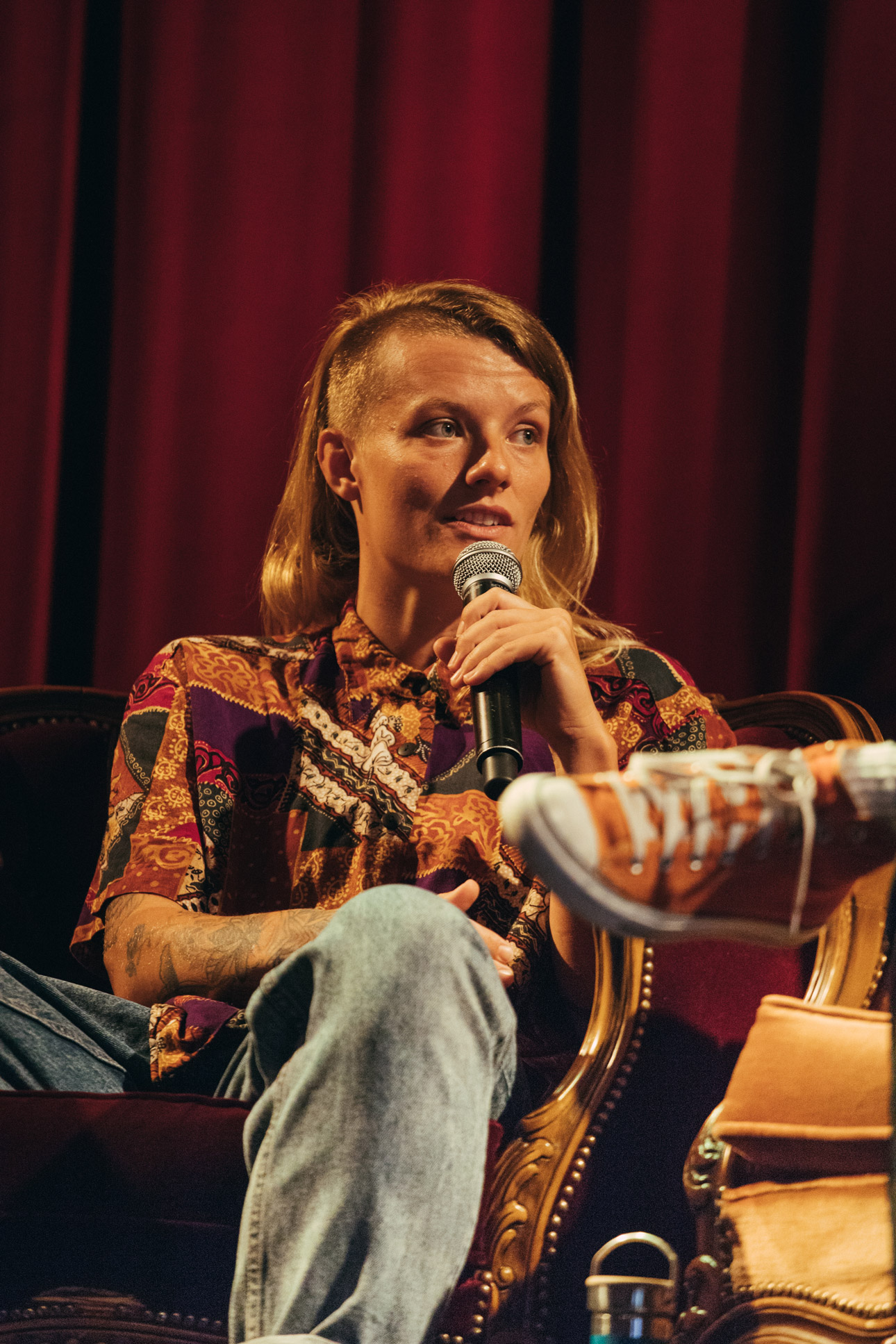

Claire Alleaume, a panellist from France, skater and writer/founder of Two Set Magazine echoes these sentiments. She states, “Every experience of skating is so different, so it is hard to treat skateboarding as a whole – but I do think some things are changing for the better, and the fact Pushing Boarders exists at all is a good sign. By making the choice to join such an event, you are opening your views to be challenged, your eyes to be opened, your awareness to be increased, your narrowness of vision to be exposed. I think that’s healthy and it makes me hopeful”. Claire also shares with others an ability to see the event was not going to provide a one size fits all solution to everything. She adds, “Some of the topics addressed and experiences shared gave us a stern reminder that there is a huge amount of progress still to be made, however. It’s also easy to remain in our bubble and get caught in our own hype… What have we learned and how do we turn it into something positive? I guess it’s up to us – all of us – to keep ‘pushing boarders’ in the right direction!”
There was certainly room for reflecting on the many shortcomings that remain as well as successes happening in skateboarding. Betsy Gordon suggests, “Although there were commonly held assumptions at Pushing Boarders that skateboarding needed more gender equality, more space given for queer folks, more industry attention to people of color, less industry money given to promoting white, male, able-bodied branding tropes, did I witness a shared assumption amongst all the Pushing Boarders participants about what is wrong or broken in skateboarding and what would make it better? Nope”. She continues, “While I noticed a diversity of perspectives and participants at Pushing Boarders, did I see an equal ratio of gender conforming and gender non-conforming? Men and women? Able- bodied and non able-bodied? Nope — it was not a skateboarding utopia, but it was pretty damn amazing and the organizers went out of their way to make it as good as (if not better than) they could”.
Photographer and attendee Emanuel Barbier supports the view that the event organizers had a lot of integrity. They comment, “In my opinion, a key issue within skateboarding is providing a platform for diverse voices. Pushing Boarders had some very diversified panels and brought forth that way, a wide range of stories, experiences and opinions. Yet, the organization also recognized when there was a lack of diversity. It showed to me that they understand the importance of providing a platform for everyone and are still working at bettering themselves in that regard”.
For the last 3 years Enni Kalilainen was the leader of the volunteer-run Finnish Womxn Skate Association @trlskate. She stepped down from that role in July. She illustrates some of the other important insights that skaters in the audience brought to the event. She explains “I’ve been a keen ‘skatetivist’ for years and I wanted to hear and listen to what’s going on this year (and are we going forward?), meet friends, make new ones and of course network. The theme of mental health in this year’s Pushing Boarders was also close to my heart. I am a 42 year old trans woman who has often struggled to navigate things and my mental health right through my life”. She adds, “The best thing at Pushing Borders is that it can influence a much wider range than just skateboarding, like over to other sports and areas of society. I really worry about PoC, immigrants, disabled, queer and especially those who happen to be also trans people at the same time. It is super sad that we transwomen are always in firing line in private and public discussions and conversations”.
Enni explains the need for trans people to have more priority in conversations about inclusion, “One worst scenario is how this can lead us to internalize transmisogyny where we start to discriminate amongst ourselves and our trans siblings. We all know which group stands on top in highest suicide rates”. And, “because of a flourishing of hate speeches and violence towards trans women”, she advises that, “Pushing Boarders could have had more talk concerning mental health, especially marginalized people’s well-being in social spaces”. She encourages for further attention towards, “How trans stigma, cis-sexism, minority stress, microaggression, etc. affects all areas of our lives and how to ensure safe, positive, social spaces that can help us evolve and give us more resilience”.
Tara Porter, one of the founders of Neighbour Skateboarding in Australia dedicated to queer, trans and gender diverse skaters shared similar views on how the event might improve. While the organisers had invited Cher Strauberry from the Unity Skateboards team to be on the Rage Against the Gaze panel, she was unable to attend. Tara urged that, “It would have been nice to see the same kind of acknowledgment and transparency in light of Cher Stauberry’s absence from the Rage Against the Gaze panel on allyship” as there was for The Revolution will not be Patronized. She states, “I was very excited to attend an event about what in my eyes was inclusivity in skateboarding. I felt like I really wanted to bear witness to conversations where people were questioning skateboarding’s current position and thinking about how to move forward”. However, she felt that, “…it gave a lot of air-time and panel space to the people that have not taken the time to be self-reflective about their privilege and how it affects the various non-traditional skater groups”. Tara observes that, “There was a large handful of people that stood out from this norm amongst the panellists, but I think that is due more to the individuals themselves. I am grateful that we were brought together and able to engage in critical conversations face to face, but… white, skater bros were (still) centered a lot”.
Also from Australia, Pushing Boarders attendee Kirby Clark from Decks for Change gives some context on some of the frustrations felt. She states, “Having grown up skateboarding in Australia, we have quite a cis-male-dominated culture that is toxic and misogynist, often subconsciously… but this is definitely a worldwide issue and something we see a lot through skate media and skate brands. I was hoping to not see much of that at Pushing Boarders and whilst the crowd was a lot more diverse than your average skatepark, that wasn’t truly represented (or considered) in the panel discussions and in the language used throughout the conference. It was a reminder to me, and I’m sure many others, that those that hold the power in skateboarding are still very much the white cis-male”. At the same time, like many others, she felt conflicts were also good learning moments and points for people to commit to making a turnaround. She argues, “What is hopeful, is that this was a big part of the feedback that the organisers and some panellists received, and while some were more receptive to this than others, I did start to see a big shift in consciousness around this from a lot of people throughout the week”.
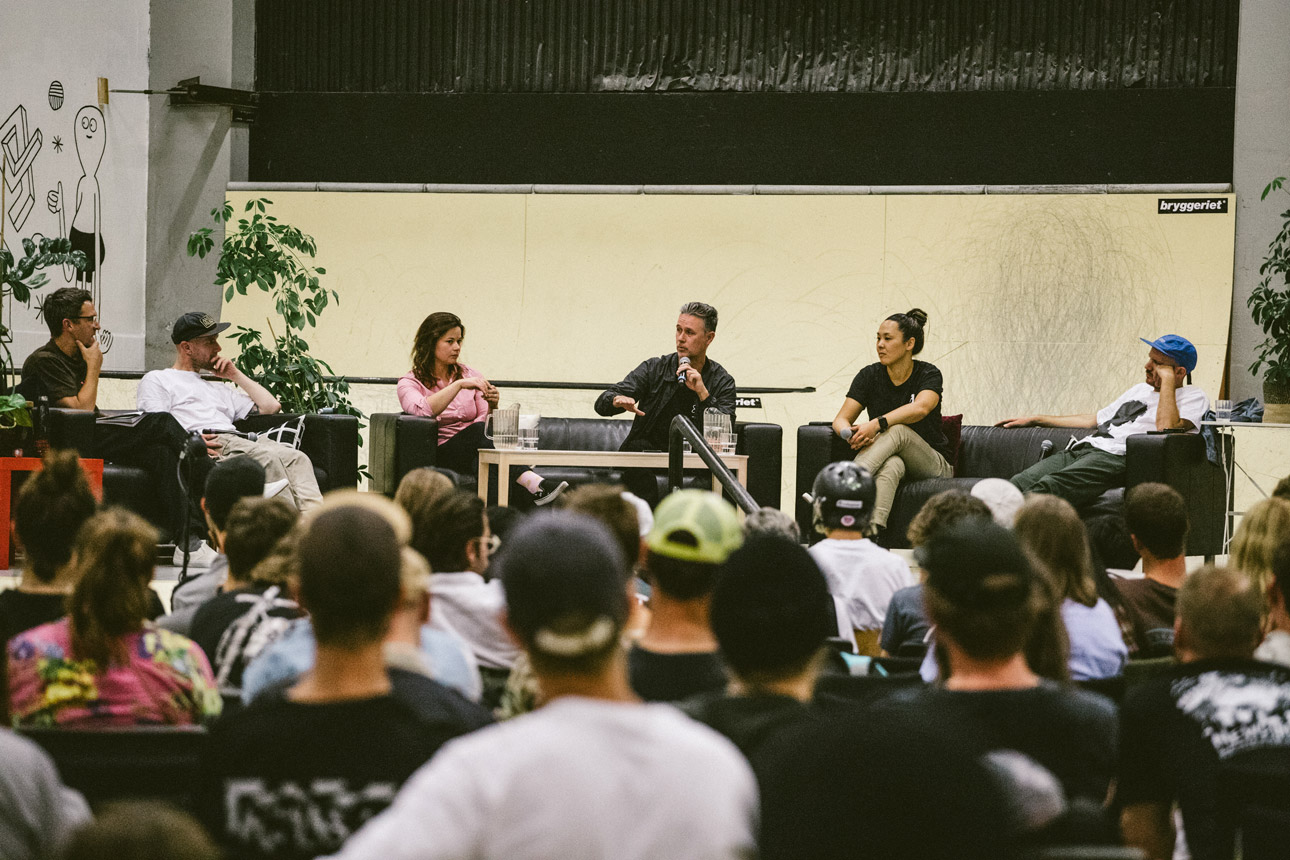
Indeed, Pushing Boarders is best viewed as an event that is constantly evolving rather than trapped into reproducing the very things it sets out to question and challenge. For instance, Kim Woozy noted differences even from last year’s event stating, “A lot has changed with the fact that there were more than 1 or 2 women in the room, and that they were speaking on stage or in the audience speaking up. That feels like light years of difference. The willingness to listen, learn and be challenged from everyone who attended, especially those in positions of influence and power was very inspiring and refreshing”. Offering further insight, Shari White, an Australian living in Canada who is a co-founder of The Skate Witches, filmmaker and a Meow team member encourages people who want to make a difference to, “be willing to learn and talk with others, and come to Pushing Boarders next year”. Joana Fongern, who provides an important perspective as one of the event volunteers, agrees that overall, “Pushing Boarders really created a safe space for all the topics.” For her, it also allowed her to meet “many beautiful and smart people that made me feel safe, comfortable and definitely pushed my self-esteem to the highest”.
Sophie Friedel highlights a particularly illustrative moment of the organizer’s humility rather than defensiveness when facing some of the limitations in the event. This includes right before The Revolution Will Not Be Patronized panel (chaired by Lucy Adams) where Kava Garcia Vasquez who had also spoken at the Academic Forum was invited to speak after Beatrice Domond was unable to attend. Prior to starting Thom Callan-Riley, one of the organizers, talked about concerns of tokenism and their failure to boost the inclusion in the program of more skaters who were African American and Black (and People of Colour more generally). Of this moment, Sophie comments, “It was a pleasure to see so many people making skateboarding better for everybody and the willingness to learn, being open and admitting things that went wrong, rather than just pretending nothing happened… That really inspired me to walk out as a more responsible person”.
Bethany Geckle, a PhD Candidate in New Zealand studying the relationship between drag, queer performative cultures and skateboarding, also points to this willingness to learn in the panelists. She recalls, “One of the memories I keep coming back to is, when being introduced on the Stay Core, Stay Poor panel, Nick Sharrat announced that he had just learned about pronouns that week and was trying to put that into practice now but that he was still learning. I thought this was such a great example of allyship to follow”. She continues, “Allyship can seem intimidating because the communities that need support may not be familiar to everyone and the type of support needed may not be obvious. Being an ally doesn’t mean you must automatically know, do, and say all the right things, but that you are eager to learn, open to new perspectives, and put effort into practicing those new ways of thinking, acting, or speaking”.
An important feature of the event was that conversations were viewed as just beginning rather than as end destinations. Also, the event encouraged people to push themselves and others out of their comfort zones. Kim Butter, an event volunteer who works at Women Skate the World put it well in her comment, “Let’s talk about who is being represented within skateboarding and how we can have a positive impact on this as a community. Pushing Boarders is doing great by giving minorities the opportunity to let their voices be heard. We have had a chance to learn about what skateboarders are fighting for. But what are we fighting against? In order for the community to change and be 100% inclusive we have to have a thorough understanding of what’s the established order. Let’s try to zoom out, out of the scene, out of ourselves and out of our own understanding of the world”.
The incredibly honest and important opening talk on mental health and the topic of suicide by John Rattray and Madeleine Uggla has been described by Adam Abada in a Quarter Snacks article as powerfully shared and with the urgent encouragement for skateboarders “to speak up and be there for each other, instead of burying our feelings under performance and product”. Tobias Coughlin-Bogue in Skateism also proposes that, “Having well-respected skateboarders get up on a stage and talk about how talking to your friends about their mental health is cool means that, yes, being open about your emotions is now officially core.” This kind of impact from Pushing Boarders may not reach as far as people there hope, but having the conference written about in Thrasher is a sign of its rising influence in places where ‘core’, as writer Ted Schmitz notes, once meant to just ‘shut up and skate’.
The rest of the conference included ten panel talks, plus an academic forum and numerous ‘break out’ workshops and seminars. The panels covered topics from skate research to how social media and technology shapes skateboarding, how we see certain skate spots as part of our cultural heritage, using skateboarding as part of school education programs, skatepark building projects in the non-West, skateboarding journalism, and on issues of gender and sexuality. For the skaters we spoke to there were many learning and take-away moments that can inform, guide and throw more light on skateboarding well beyond the conference.
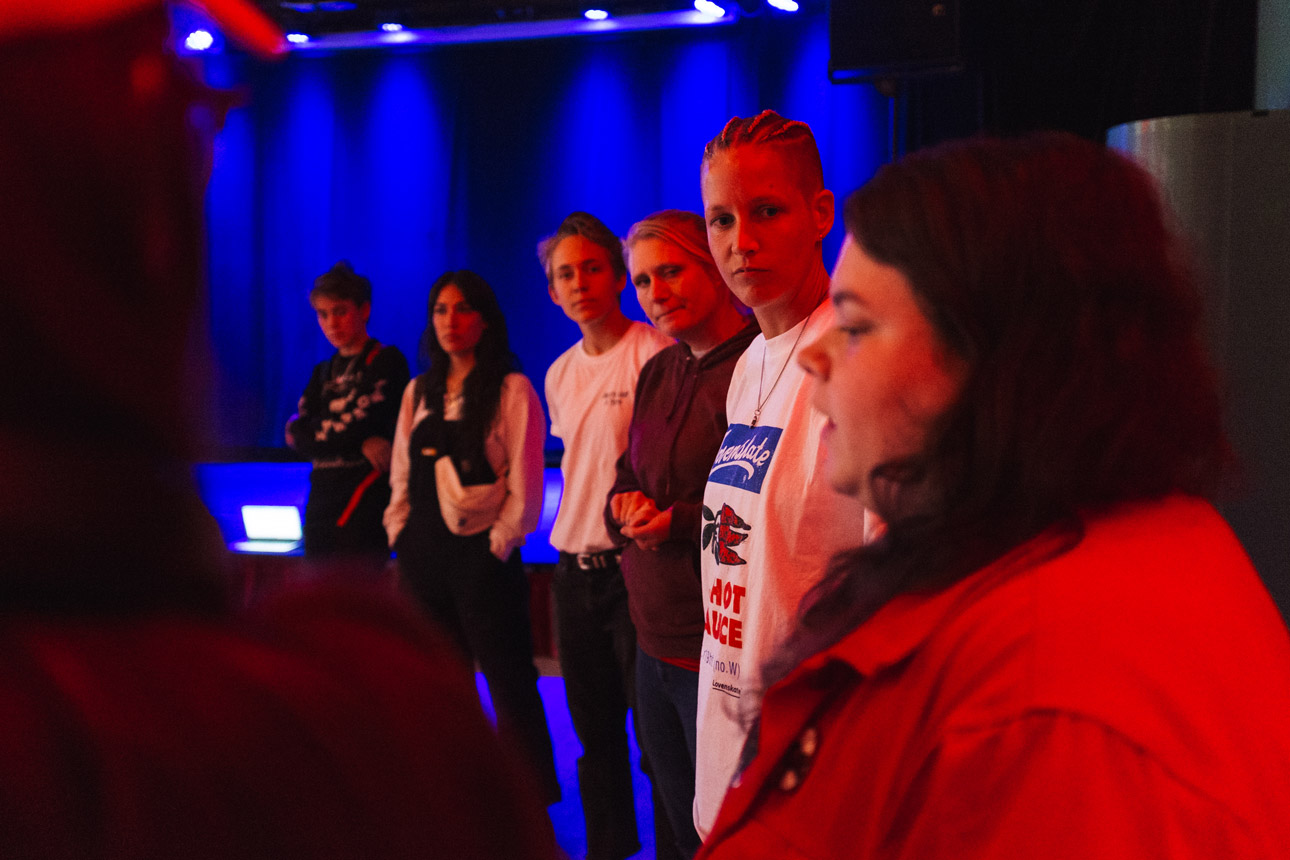
The mood generated amongst the researchers from the Academic Forum and The University of Skate: Support Your Local Academic panel that I spoke to was one of collaboration rather than competition. Beatrice Hallman felt, “We have a massive chance here, all of us, to collaborate, to investigate, to give constructive critique regarding our various interests and research work. I’m so grateful to have had an opportunity to be located together with this many genius academics that can give constructive critique, intervene and consider about skateboarding and our community, from so many important perspectives and angles”. The variety of scholars was also appreciated by Bethany Geckle who commented, “you had people doing social development research mixed with those in sociology mixed with architecture… hearing Camille Ayme talking about the physical traces skateboarders leave on the city being paralleled by the physical traces the city leaves on the skaters’ bodies resonated so much with me and my own interests”. This variety also reflects the expertise of the Re-Verb Skateboarding group (Dr Sander Hölsgens, Thom Callan-Riley, Dr Chris Lawton and Dr Dani Abulhawa) who are the driving force behind the academic programming of Pushing Boarders.
Dr Adelina Ong, an independent researcher from Singapore based in the UK and panellist remarked on the new ways we can see skateboarding through theatre and dance studies, stating “Dani’s research is shifting away from the spectacular approach towards skateboarding research. She argues for an understanding of skateboarding as a somatic practice. One of the audience members who came up to me after the panel said that for him, skateboarding is something he’s always thought of as a dance. That got me really excited”. Adelina also appreciated how the researchers called attention to populations that are often neglected by skate academics, such as “how Dr Indigo Willing highlighted the importance of territorial acknowledgement (of First Nations) in her introduction of her research. I also love how her research is pushing for skateboarding to be understood as part of active aging. That’s important in giving skateboarding more of a research platform outside of youth studies”. Sophie Friedel, also on the academic panel adds that on the topic of mental health that was also discussed, “I liked the argument of Dr Adelina Ong about the self-care-industry being that multibillion-dollar business… and her point that much of self-care is not care at all but an attempt to keep the workforce going”. Sophie continues, “So what can we do? I guess finding a good balance between self-care and community-care. With community care, I mean a commitment to contribute and showing up for others in need in a way that leverages our own relative privilege, while balancing our own needs”.
With unanimous agreement, The Revolution will not be Patronized was seen as one of the most emotionally honest and profound panels, chaired by Lucy Adams, and with Candy Jacobs, Kava Garcia Vasquez (writer and Skate Mozambique), Kristin Ebeling (The Skate Witches, Skate Like a Girl and Vent City), Mimi Knoop and Amber Edmondson (Womxn Skate the World). The panel began with Amber talking about the refugee crisis in Greece. She reported after that, “The amount of people who said afterwards that they had literally no idea and offered to share it out over their platforms was incredible. Having that one room of people hear and understand the sheer scale of this humanitarian crisis and take that onboard is the most important thing that came from Pushing Boarders, for me”. To learn more see Help Refugees and Are You Sryious.
The conversations on stage that followed included discussions such as equal pay, getting decent representation in the media, DIY projects and creating a space where everyone could be supportive and let womxn and non-binary skaters be successful on their own terms rather than living up to mainstream expectations. Kava spoke eloquently and powerfully on issues of intersectionality including on issues of heteronormative, cis-centric, racist and colonialist practices in skating, and from a non-binary individual’s perspective. The discussion of having to be judged by looking ‘too feminine’ and therefore not ‘core’ was also raised by other panellists, as was the hindering ways skaters can get unwanted attention to how they looked rather than what they were doing for skateboarding. This was similar to frustrations raised by Lacey Baker in the Rage Against the Gaze panel who spoke about how sponsors tried to push them into looking ‘feminine’ and not cut their hair.
The discussion of ‘who cares how we look?’ then led to a sometimes paradoxical and relatively new topic in skateboarding about skaters who are models. Amber Edomonson advised the audience not give into “the baiting to start hating other womxn in skateboarding” based on self-expression e.g. more fashionable and non-traditional skate clothing and choice to be models. When I asked her what advice she would give to skaters who are starting to do that she advises, “Don’t do it, it’s a trap. Here’s the thing, hating on other womxn does not legitimise you, it only divides us and strengthens power structures designed to hold womxn back and further gender disparity. That way, they get to dismiss this womxn because she’s too femme and just using her looks while dismissing another womxn because she’s too butch, not marketable enough etc”. Amber adds, “We need to raise the standards of allyship and demand zero tolerance for prejudiced, pro-normative and discriminatory behaviours. But we also need to hold ourselves accountable and hold ourselves to the same standards we’re demanding. Stay alert, don’t get caught in the trap”.
Kim Woozy also spoke to me about this issue, and with full support for skater/models like Briana King who was a panellist and creator of Display Only which has been rolling out womxn and queer skateboarding workshops across the world. Kim enthusiastically remarked, “I loved the discussion around Instagram models/influencers vs pro/core skaters that came up on… Essentially, society’s desire to pit women (and all genders for that matter) against each other is a systemic problem and needs to be questioned”. Offering further thoughts, Kim adds, “On an individual and collective level, I think it’s important to be aware of the distinction between the value of finding individual strength in community (the idea of crews/squads/teams) and minimizing individuals to a category/label. There is value in getting to know people and their stories as individual humans versus putting them in a box and assuming”. She also commented, “Shout out to Briana, keep doing you!”
While I didn’t get a chance to meet Briana, she featured on two panel talks including Rage Against the Gaze and Tech Will Save Us. Her strong sense of community and generosity in using skating for not just personal rewards but as a way to connect people and gift them with the same joy skating has brought all of us really stood out. She is also a proud advocate for LGBTIQ+ communities and People of Colour in the skate world. Skateboarding could not have a stronger example for why people really need to put to rest stereotypes and quick judgements about skaters who are also successful Instagram influencers and models. Let’s cut that shit out and support people doing what they do and see the doors they open for others rather than slamming the door and reproducing a type of gate-keeping in skateboarding that rarely lets skaters who aren’t (cis) men progress in the first place.
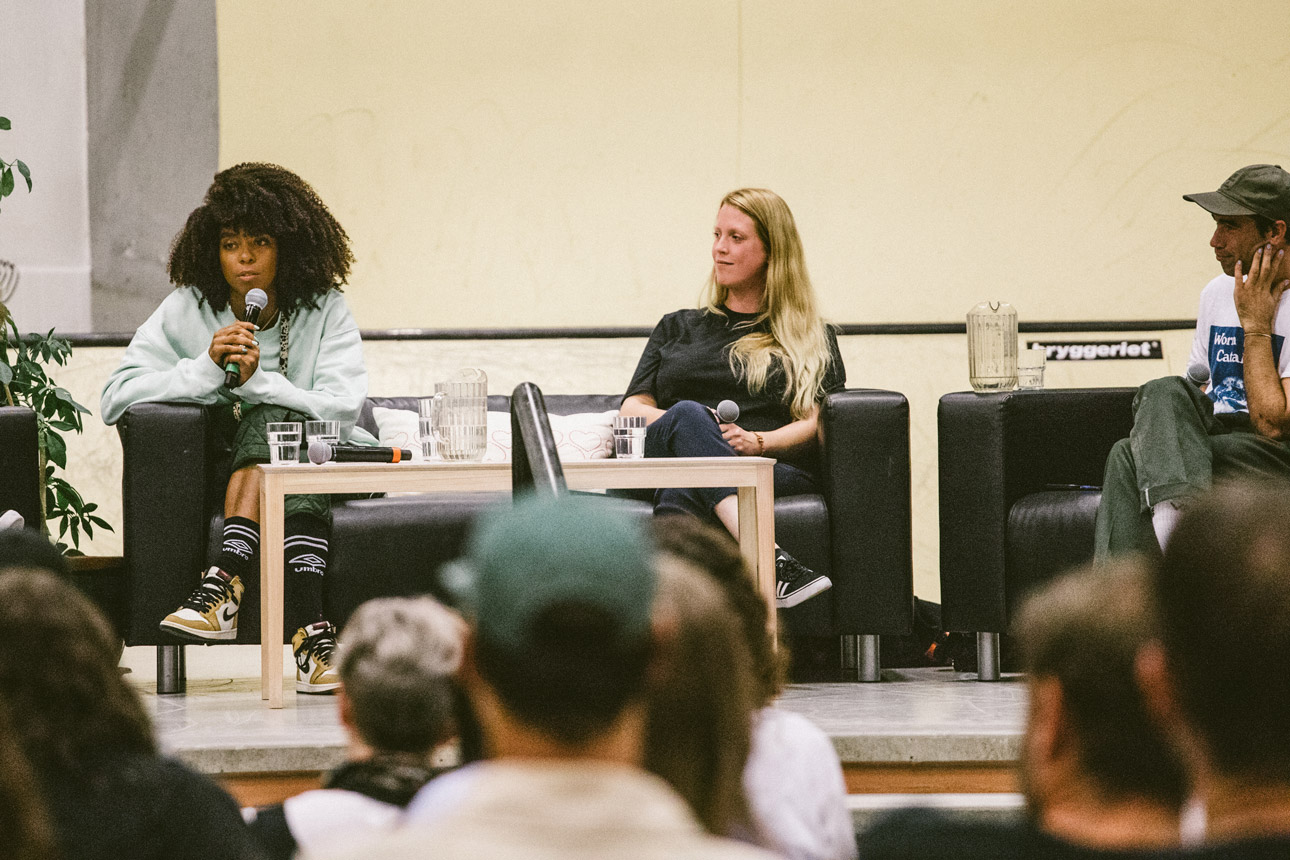
Other benefits of this stand out panel was the sense of permission it gave for hard topics to be talked about. Candy Jacobs commented that, “People who were in that space experienced something that made them want to be a part of changing skateboarding as we know/perceive it and creating more awareness. The responses varied from ‘That was so bad ass’ to ‘Damn, that made me cry’. For me the main thing was that all of us on the panel felt safe enough to speak openly about the matters we wanted to discuss, that says something about the audience”. As chair, Lucy Adams agreed that, “The whole experience of the panel was hugely positive and I’m so proud of all the women that took part and spoke their truths and experiences. We had such good feedback and it was definitely a rollercoaster of emotions!” Mimi Knoop also reflected this appreciation stating, “The main feeling I left with was that each person on our panel brought with them a unique set of backgrounds, opinions, and perspectives — and there was room for all of us to have a voice. I felt respect, harmony, intelligence and allyship from the other panellists. It was a rad experience! Hats off to Lucy, Candy, Kava, Amber, and Kristin!”
In the Globally Stoked Panel skaters who are encouraging the growth of skateboarding through collaborating with non-profits such as SkatePal in Palestine, Skateistan in South Africa, Concrete Jungle Foundation in Peru and Girls Skate India were brought together to share their locals perspectives and globally valuable expertise. For panellist Leyla G. Leon from Concrete Jungle Foundation in Peru, highlights for her included, “discovering that we were from different cultures and different continents, with similar problems and the same desire to seek improvements in our communities. The union that is being formed as a fundamental value and respect towards the different points of view, culture and communities”.
Atita Verghese from Girls Skate India also talked about the commonalities each panellist shared and the value of also hearing about their more unique experiences. She states, “When Aram Sabbah (Skate Pal, Palestine) talked about how ‘aid’ can also be in the form of just going to visit the place and hanging out and skating with the locals. You don’t have to be anyone, have an organisation or fund things if it’s not within your reach. Just visiting goes a long way. I strongly feel this in my own context as well”. Of Ayanda Mnyandu (Skateistan, South Africa) she appreciated how he “spoke about international aid programs leaving knowledge and resources behind and allowing the local communities to develop their own scene because no one understands how to go about things better than the local communities”. She also highlighted when Leyla spoke “about the mental health effects on marginalised youth. I can strongly confirm that it does wonders for these kids. In my own experience I’ve seen young boys who are marginalised and were into bad company and stealing etc change remarkably with skateboarding and a positive community force behind them”.
In the Tech Will Save Us? panel, Imke Leerink, who with Briana King was one of the two womxn speakers, spoke of a source of disappointment, “hearing about women getting posted on mostly men featured platforms and getting so much hate is something I of course already know, but it is something that shows is a big issue”. At the same time, she felt, “on a positive note, I really liked hearing that Brianna never got any hate on her platform and also on Girls Shred the hate comments are not always that common”. For her, “the fact community plays a big positive role in the platforms, with helping each other and finding new buddies to connect with is something which is so great to hear!”
I also spoke to the two womxn on the Stay Core, Stay Poor panel, Kim Woozy and Claire Alleaume. Claire was open to the idea that working with some industry types could benefit skaters, and particularly when companies were hiring skaters. She explains, “When whoever’s running things — let it be big companies, small companies, media or events — are skateboarders who give a shit about skateboarding and skateboarders, I’m hopeful!” She also felt, “Wherever people sit on this – whatever their views on the industry, the Olympics, etc — they tend to give a shit. People are really passionate about it one way or the other because they care about skateboarding. Of course, you can turn passion into a positive or a negative driver, but ultimately I think it’s great that people care!
Kim Woozy also expands the term ‘core’ itself to something more open and relatable for skating in contemporary times. She states, “For me, the idea of “core” ties back to “core values.” Meaning sticking to your truth, what inspired you as a young person during a time when you are uncertain… Our core values stay with us as we grow up. So, if I relate to staying “core” as staying authentic and true to original self, it can be quite positive”. She also brings in an important perspective, “In looking at “core” for womxn and non-binary skaters, it’s also about staying true to yourself. I think for a long time skaters on the outskirts/margins have always been core because there were no other outside influences (systems/pathways/formulas created by others)”. She also notes that, “now that skateboarding has fully transitioned to mainstream and there are these systems and pathways in place, the value of staying true to yourself and your core values is more important than ever. That set of core values is different for each person”.
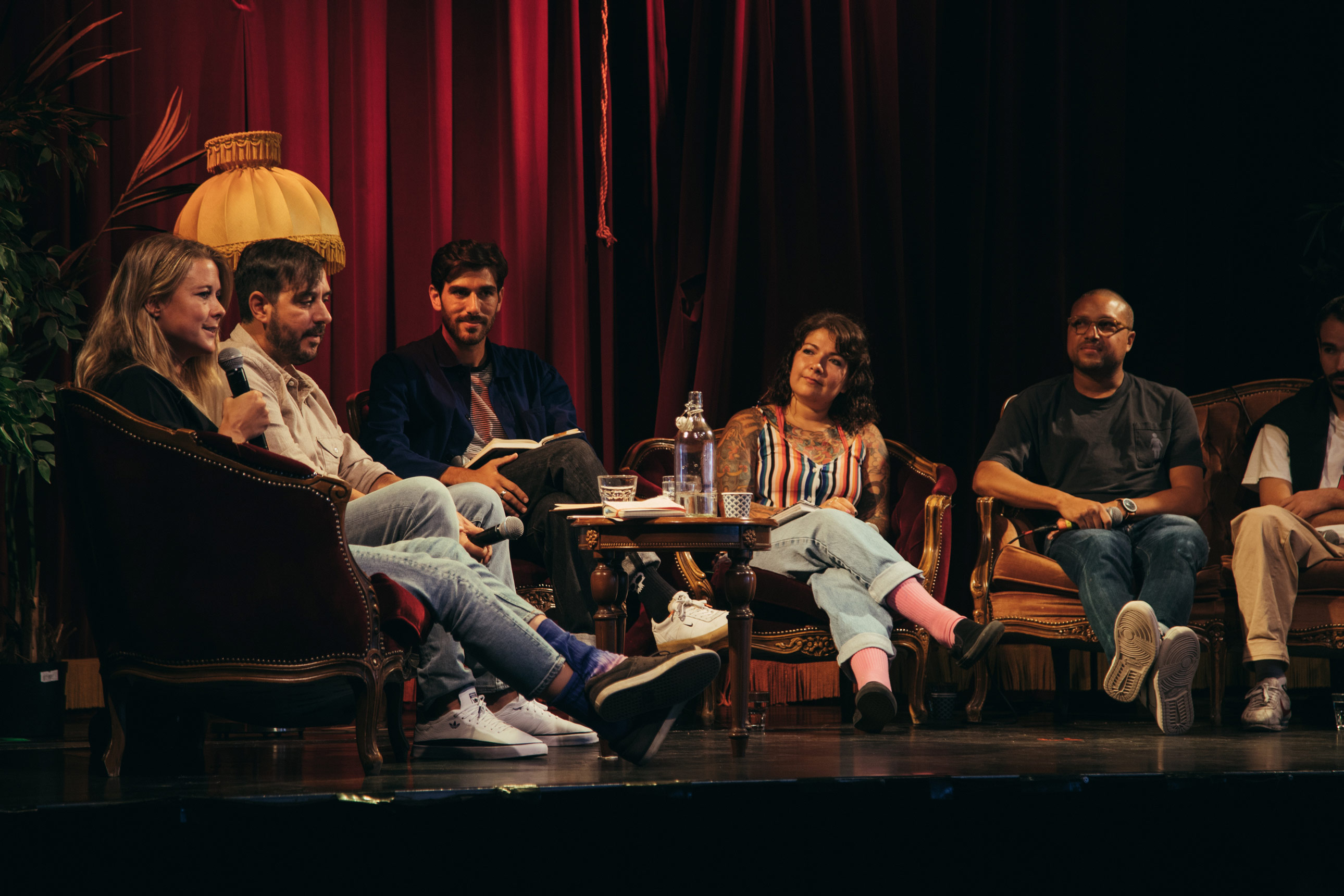
The panels Bad Design is a Crime: Skate Friendly Cities (with Kristin Ebeling and Dr Karin Bjork giving important perspectives) and Sacred Spots: Defining Heritage in Skate Culture focused on iconic areas skaters thrive in, preserve, document and embrace as a central part of their history, sometimes in conflict with developers and councils. Men’s perspectives are easily amplified and made central, if not the only ones, in discussions of such spaces and their social significance. But Pushing Boarders made hearing from more diverse voices and input possible, and the ‘Spaces Workshop’ chair Dr Chris Lawton noted a need to keep this momentum going.
Dr Pollyanna Ruiz who was on the Sacred Spots panel states, “during this panel I saw this [preservation of skate spots] in the wider context of skateboarding across the globe. It made me see this as work that extends beyond the willingness of a relatively small number of individuals to save a particular and very localised spot and to see it instead as a community wide response to more globalised dynamics.” Highlights for her were the achievements by the watershed efforts of Long Live South Bank (with Stuart Maclure on the panel) and Love Park (with Gustav Eden of Skate Malmo reflecting on their remarkable transnational preservation and recreation efforts).
Betsy Gordon who co-chaired the panel with Gustav recalls a favourite moment for her was “Pollyanna Ruiz admitting that the academics did not need the skaters to learn from them; the academics needed to learn from the skaters”. At the same time, it is clear that everyone can help each other achieve wonderful things. For instance, giving practical advice that can be used well beyond Pushing Boarders Pollyanna adds, “From a campaigning perspective I would encourage communities seeking to preserve their spaces/heritage to think very acutely about exactly what it is that they want (More space? Better lighting? Freedom from fines? Respect?) and then think about who they are going to engage in debate (are they going to talk directly to decision makers? Or try and win the support of the wider public? Are there key cultural/sports/political figures who could be approached?) And finally how they are going to engage in debate (Email? Social networks? Local Press? Face to Face?). A little time spent thinking and talking about these things will probably pay off later down the line”.
The Skate and Educate: From Classrooms to Communities panel also valued how academics and educators can, do, and should learn a great deal from skaters. For instance, Dr Esther Sayers, a researcher, volunteer and skater from the UK on the panel reflected on how skating has an absolute truth to it, whereas a lot of academia is theory without practice. Dr Jessica Forsyth also points out, “Skaters are brilliant in a way that formal educational institutions often don’t recognize or appreciate, which is why Bryggeriet is such an amazing school. There should be schools for skaters all over the world and skaters from anywhere in the world should be able to attend these schools”. Bryggeriet High School in Sweden may be the only ‘skate high school’ in the world but an announcement for one in Finland was made in September and hopefully more will follow. In the meantime, her work with the Harold Hunter Foundation for instance is, “really working towards focusing on providing the resources, opportunities, connections, and skills skaters need to transition from adolescence to independent adulthood, find success that is meaningful for them, and have an impact that goes beyond their immediate skate scene.”
The emphasis on skateboarders as being able to inspire people not just on the board but also in all walks and areas of life is echoed by Norma Ibarra, a prolific skate photographer from Mexico, whose collaborations include with the Skate Witches, Yeah Girl and more, and covers countries as far apart as Sweden to Cuba. In the Brutally Honest Skate Journalism panel chaired by Hannah Bailey with Anthony Pappalardo, Norma highlighted how, in the world of skate journalism, people must continue to encourage womxn to work behind the camera and content-making sites to further improve how they are represented in the media. She also believes everyone can contribute and that the time is ripe for change. Her advice? She states, “Never be scared to ask, if you have an idea or a question. Do it! We have amazing talent in our skate community, let’s continue networking and brainstorming on new projects and action plans to continue this evolution. If you are reading this I am here for you!…I invite you to the next Pushing Boarders, you won’t regret it!”
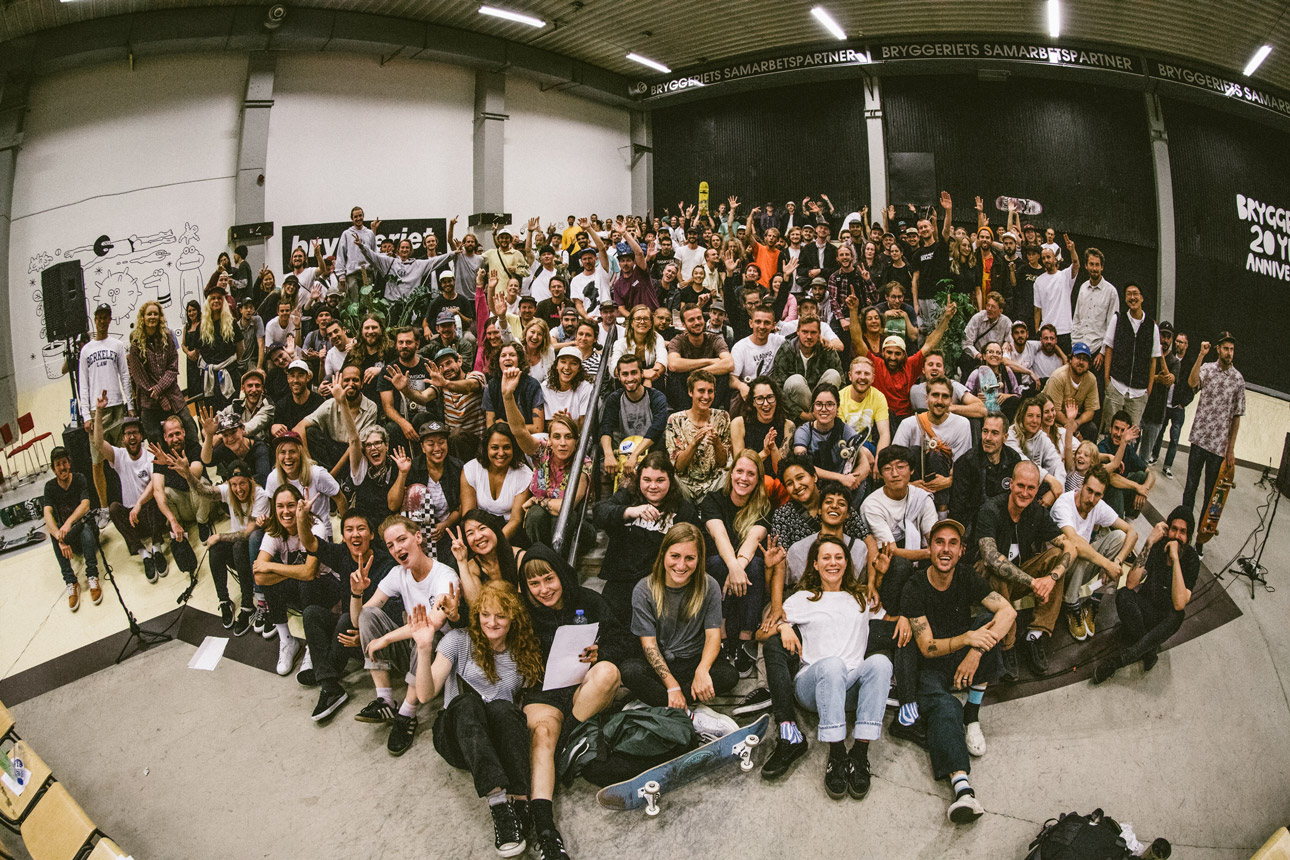
In this article the Pushing Boarders ‘class of 2019’ talked about how skateboarding has changed from the past to now, why it is a sign of the times and what were some of the biggest learning experiences they had. In Part 2 the focus turns to looking at what kind of mentors and networks arise from the world’s only skateboarding conference. The conference’s theme of mental health will also be considered, and what advice people at Pushing Boarders have on how they have overcome issues of self-esteem and anxiety about skateboarding, from individuals who are pro-skaters to people just starting to roll. Part 3 then asks ‘how far has skateboarding still got to go’ in terms of being ‘for everyone’ and concludes by asking advice from this amazing group of womxn, non-binary and non-conforming gender diverse group of individuals from around the globe ‘how skaters can change the world’? Stay tuned…
* Update: Leo Baker changed their first name in January 2020 and now go by the pronouns he/they. This article has been edited to reflect that change.
Photos: Norma Ibarra
Text: Indigo Willing
A few weeks ago, some of the movers and shakers of our global skate community met up to discuss important…
Di’orr Greenwood’s skateboarding story is multifaceted and powerful, from rolling with a fun loving and hard-shredding all women’s crew, to…
Making miracles happen and living out the motto to "push possible" is all in a day’s work for Yulin Olliver.…
The latest news, event invites and Yeah Girl exclusives direct to your inbox.
Site designed by BLNKT and built by Thirteen Digital